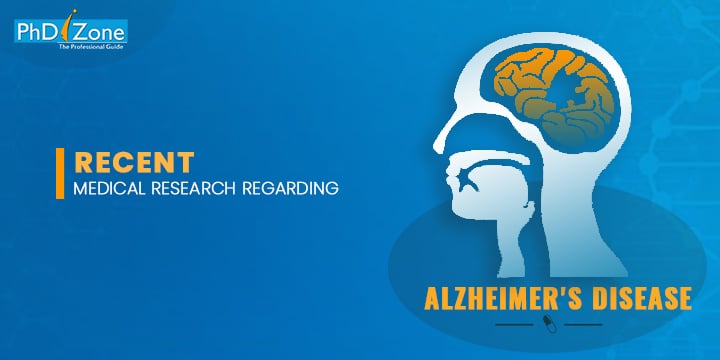Recent Medical Research: Alzheimer’s disease is a progressive disorder that causes brain cells to degenerate and die. Alzheimer’s disease is the most common cause of dementia – a continuous decline in thinking, behavioural and social skills that disrupts a person’s ability to function independently.
The early signs of the disease may be forgetting recent events or conversations. As the disease progresses, a person with Alzheimer’s disease will develop severe memory impairment and lose the ability to carry out everyday tasks.
Current Alzheimer’s disease medications may temporarily improve symptoms or slow the rate of decline. These treatments can sometimes help people with Alzheimer’s disease maximize function and maintain independence for a time. Different programs and services can help support people with Alzheimer’s disease and their caregivers.
There is no treatment that cures Alzheimer’s disease or alters the disease process in the brain. In advanced stages of the disease, complications from severe loss of brain function – such as dehydration, malnutrition or infection – result in death.

Comparison of a normal aged brain (left) and the brain of a person with Alzheimer’s (right) is shown in the above figure.
Table of Contents
Symptoms – Recent Medical Research
Memory loss is the key symptom of Alzheimer’s disease. In this Recent Medical Research, an early sign of the disease is usually difficulty remembering recent events or conversations. As the disease progresses, memory impairments worsen and other symptoms develop.
At first, a person with Alzheimer’s disease may be aware of having difficulty with remembering things and organizing thoughts. A family member or friend may be more likely to notice how the symptoms worsen.
Brain changes associated with Alzheimer’s disease lead to growing trouble with:
Memory
Everyone has occasional memory lapses in Recent Medical Research. It’s normal to lose track of where you put your keys or forget the name of an acquaintance. But the memory loss associated with Alzheimer’s disease persists and worsens, affecting the ability to function at work or at home.
People with Alzheimer’s may:
- Repeat statements and questions over and over essay writing service
- Forget conversations, appointments or events, and not remember them later
- Routinely misplace possessions, often putting them in illogical locations
- Get lost in familiar places
- Eventually forget the names of family members and everyday objects
- Have trouble finding the right words to identify objects, express thoughts or take part in conversations
Thinking and Reasoning
In Recent PhD Medical Research, Alzheimer’s disease causes difficulty concentrating and thinking, especially about abstract concepts such as numbers term paper writing.
Multitasking is especially difficult, and it may be challenging to manage finances, balance check books and pay bills on time. These difficulties may progress to an inability to recognize and deal with numbers.
Making Judgments and Decisions
In order to, the ability to make reasonable decisions and judgments in everyday situations will decline. For example, a person may make poor or uncharacteristic choices in social interactions or wear clothes that are inappropriate for the weather. It may be more difficult to respond effectively to everyday problems, such as food burning on the stove or unexpected driving situations.
Planning and Performing Familiar Tasks
In spss analysis, Once-routine activities that require sequential steps, such as planning and cooking a meal or playing a favourite game, become a struggle as the disease progresses. Eventually, people with advanced Alzheimer’s may forget how to perform basic tasks such as dressing and bathing.
Changes in Personality and Behaviour
To begin with, Brain changes Recent Medical Research that occur in Alzheimer’s disease can affect moods and behaviours. Problems may include the following:
- Depression
- Apathy
- Social withdrawal
- Mood swings
- Distrust in others
- Irritability and aggressiveness
- Changes in sleeping habits
- Wandering
- Loss of inhibitions
- Delusions, such as believing something has been stolen
Preserved Skills
Many important skills are preserved for longer periods even while symptoms worsen. Preserved skills may include reading or listening to books, telling stories and reminiscing, singing, listening to music, dancing, drawing, or doing crafts. However, these skills may be preserved longer because they are controlled by parts of the brain affected later in the course of the disease research about biotechnology.
When to See a Doctor
As a matter of fact, a number of conditions, including treatable conditions, can result in memory loss or other dementia symptoms. Specifically, if you are concerned about your memory or other thinking skills, talk to your doctor for a thorough assessment and diagnosis. At the same time, if you are concerned about thinking skills you observe in a family member or friend, talk about your concerns and ask about going together to a doctor’s appointment.
Final Thoughts
At PhDiZone, we provide the custom dissertation writing services, research report writing. Especially, our technical writers are expert with highly qualified and professional by nature. Get help with your thesis today from us. Visit us PhDiZone
Written by,
Meenatchi Sunndhar P I, M.E., AMIE.,
(With BEC Vantage (B2 in CEFR) – IELTS band score of 5.5 and Cambridge English Scale Score:160)








